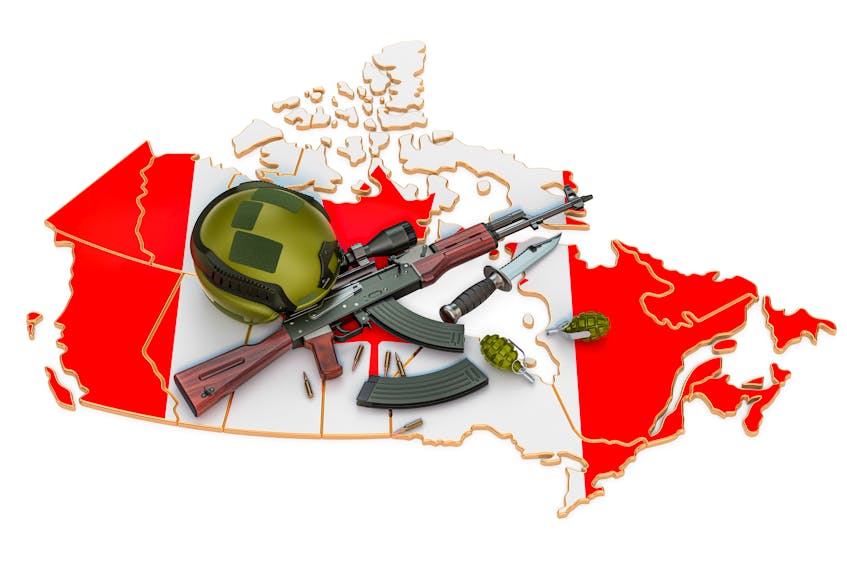Peter McKenna
Guest opinion
Many years ago, I was looking into Pratt and Whitney Canada’s military-related exports to places like China and Indonesia — where basic human rights are routinely violated. Obtaining the relevant information was, however, a lot harder than I had initially anticipated.
For starters, I basically got the run-around from two or three federal government departments. As public servants, and thus charged with serving the public, they weren’t at liberty to say what Pratt and Whitney was actually up to. The one thing that I did hear, which was quite revealing nonetheless, was that Canada wasn’t responsible for what happened to its military exports once they were placed in the arms of the recipient country.
They were also quick to point out that they would not comment on specific arms permit applications. And they certainly wouldn’t share with me the details of what those applications entailed — invariably resorting to the standard response that such information is proprietary or confidential so as to protect a company from commercial competitors.
Curiously, if you listen to what a Global Affairs Canada spokesperson is saying today, Ottawa has a stellar record when it comes to monitoring the export of military hardware abroad. “Canada has one of the strongest export-controls systems in the world, and respect for human rights is enshrined in our export-controls legislation,” she told The Globe newspaper.
Through its arms shipments to Saudi Arabia, though, Canada was recently singled out in a United Nations Human Rights Council panel report for helping to perpetuate the ongoing conflict in Yemen. In the words of one of the panellists from Canada, Ardi Imseis: “This year we added Canada because there has been an uptick in arms sales by Canada in 2019. We therefore reiterate our call for states to stop transferring arms to the parties to the conflict.”
With millions facing severe famine and over 100,000 people already killed by lethal air strikes in Yemen, this is clearly a black eye on Canada’s reputation as a good international citizen. As Project Ploughshares executive director, Cesar Jaramillo, explained: “The Trudeau government, which prides itself on a foreign policy based on respect for the rules-based international order, human-rights protection and feminism, cannot ignore Canada’s dishonourable inclusion in this report.”
Indeed, it’s hard to square the fact that Canadian arms exports are involved in the military conflict in Yemen with any notion of the governing Liberals’ touted feminist foreign policy. Remember, this military equipment is being used to attack a maternity hospital in Yemen, to crush internal dissent in Belarus and to paint targets on the ground for missile strikes in Nagorno-Karabakh.
Recent media reports have maintained that an Ontario company is allegedly exporting military hardware — imaging and targeting systems for laser-guided bombs — to Canada’s NATO ally Turkey. And these same systems, used by drones or fighter aircraft, have been deployed by the Azerbaijani military (supplied by Turkey) in the ongoing conflict in the disputed region of Nagorno-Karabakh. At the same time, the Armenian National Committee of Canada issued a pointed statement: “Canada is effectively becoming complicit in the crimes committed with Azerbaijan.”
In early October, the federal government suspended the permits to that Ontario business for target-acquisition exports to Turkey. As Foreign Affairs Minister Francois-Philippe Champagne noted: “In line with Canada’s robust export-control regime and due to the ongoing hostilities, I have suspended the relevant export permits to Turkey, so as to allow time to further assess the situation.”
It has been left to Global Affairs Canada, however, to investigate the matter of whether Turkey has indeed re-directed the military goods to another country.
But the problem here lies with the fact that such a review will, by its very nature, involve a serious conflict of interest. With all due respect to Canadian officials within the Export Controls Division, you are hardly impartial or detached observers from the process. To be sure, part of your mandate is to promote Canada’s economic interests abroad—even in countries with poor human rights records.
Accordingly, there is a need for an external agency, separate from Global Affairs Canada, to vet these requests for arms export permits. This would avoid the tendency of foreign policy officials to favour Canadian commercial interests over international human rights considerations. Independent and objective experts on a panel would, moreover, have no stake in the process and thus be more likely to honour both the spirit and the letter of Canada’s arms export-control regime.
With such a panel and process in place, there is a greater chance that these proposed military exports will be halted. Of course, it may not be good news for the Canadian business community. But it will certainly give credibility to Canada’s voice when it speaks on matters of advancing international human rights.
Peter McKenna is professor of political science at the University of Prince Edward Island.









